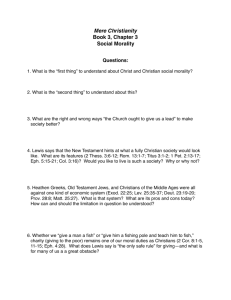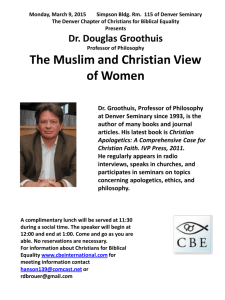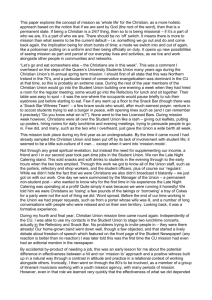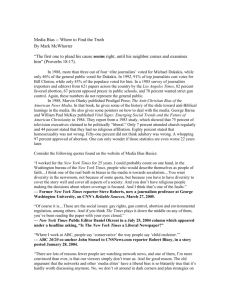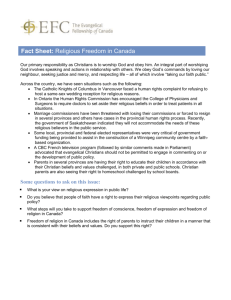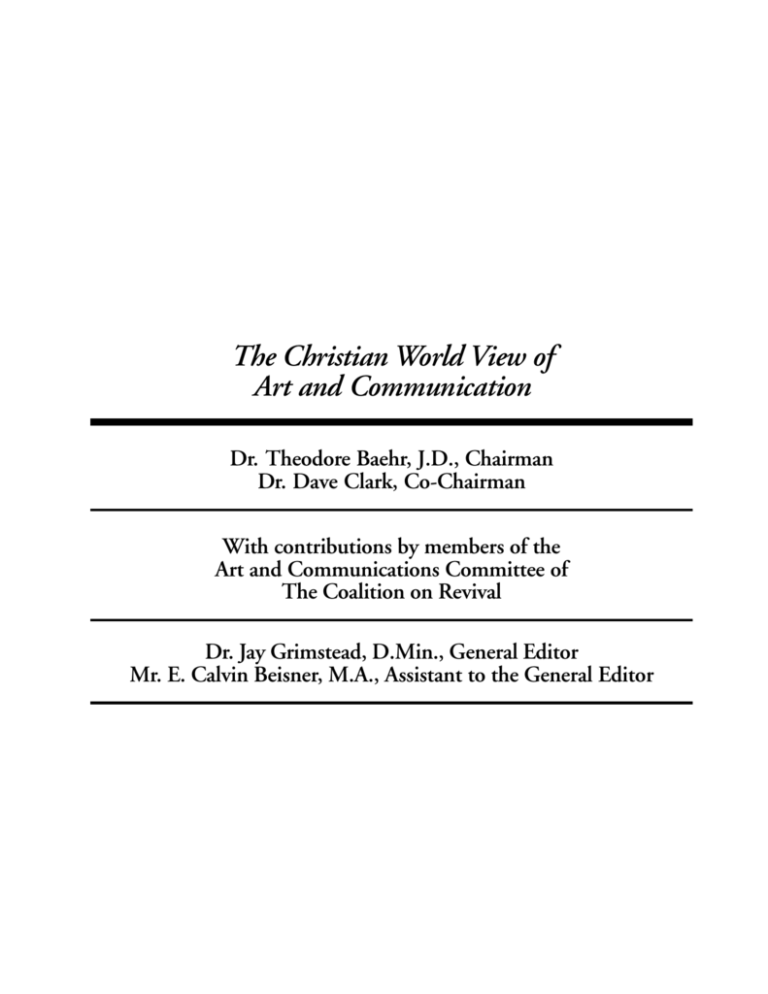
The Christian World View of
Art and Communication
Dr. Theodore Baehr, J.D., Chairman
Dr. Dave Clark, Co-Chairman
With contributions by members of the
Art and Communications Committee of
The Coalition on Revival
Dr. Jay Grimstead, D.Min., General Editor
Mr. E. Calvin Beisner, M.A., Assistant to the General Editor
The Christian World View of Art and Communication
Copyright 1989 and 1999, The Coalition on Revival, Inc. All rights reserved.
Manufactured in the United States of America.
No part of this document may be reproduced in any form or by any electronic or
mechanical means, including information storage and retrieval systems, without
permission in writing from the Coalition on Revival, except by a reviewer, who may
quote brief passages in a review.
The Coalition on Revival, Inc.
P.O. Box A
Sunnyvale, California 94087
Contents
What is the Coalition on Revival? ............................................................................... 4
About the 17 World View (Sphere) Documents ......................................................... 4
Preface .......................................................................................................................... 5
The Premise ............................................................................................................ 5
Problems ................................................................................................................. 6
Biblical Solutions .................................................................................................... 6
Statements of Affirmation and Denial ........................................................................ 7
A Call to Action in Art and Communication ............................................................ 10
General Actions .................................................................................................... 10
Specific Actions .................................................................................................... 11
Conclusion ............................................................................................................ 12
4
COR Sphere Document
What is the Coalition on Revival?
The Coalition on Revival is a network of evangelical leaders from every major denominational and theological perspective who
share a vision for and a commitment to revival, renewal, and reformation in Church and society in America.
People of Anabaptist, Arminian, Lutheran, Calvinist, and Wesleyan denominational backgrounds are all represented among
COR’s leaders. Pre-, a-, and post-millenialists are cooperating with each other, sharing the exciting task of getting God’s will to be
done on earth as it is in heaven insofar as that is possible between now and whenever Christ comes back to Earth. Charismatics
and non-charismatics, covenant and dispensationalist theologians, have joined arm in arm in prayer and hard work to see revival,
renewal, and reformation in the Christian Church and the American culture.
COR’s vision is to see Christians everywhere doing all they can in the power of the Holy Spirit to take every thought captive to
the obedience of Christ (2 Cor. 10:5), in every aspect of life. Toward that end, we have developed a series of worldview
documents that set forth what we believe are the fundamental and essential points of the total Christian world and life view. The
COR worldview documents state what we believe are the biblical principles for all spheres of human life including theology,
evangelism, discipleship, law, civil governments, economics, education, family, medicine, psychology and counseling, arts and
media, business and professions, and science and technology. We believe that the COR worldview documents state where the
entire Church must stand and what action it must take to accomplish its task in the remaining years of the Twentieth Century
and on into the next century.
COR steering committee members from all walks of life were joined by many hundreds of other interested Christian scholars,
pastors, and laymen in developing the COR documents during many series of workshops and conventions. Each document
therefore, reflects input from theologians, philosophers, professionals in their respective fields, pastors, and lay Christians. We
have sought to avoid denominational and theological bias in the documents; our aim has been to focus on principles so
fundamental that we are convinced no Bible-believing Christian who studied the major questions related to each sphere of life
would come to a contradictory conclusion.
COR views itself as a “Bible obedience, holiness movement” that crosses denominational and theological lines. The next step on
its agenda, now that its basic documents are complete, is to disseminate them widely and to educate hundreds of thousands of
Christians on how to make Christ Lord of absolutely every aspect of life. We plan to do that through publications, and through
seminars, and training workshops in the major cities of America and Canada. COR will also work in cooperation with other
Christian networking groups to help unify the pastors in major population centers around the vision of mobilizing their people to
“Get God’s will done in their city as it is in heaven” to whatever degree that is possible before the return of Christ. We believe
America can be turned around and once again function as a Christian nation as it did in its earlier years. We believe that wherever
the pastors of any city in the world join together in unity to make Christ Lord of every sphere of life, and, with Spirit led strategy,
mobilize their people into a unified spiritual army; that city can and will become “a city set upon a hill” and be “a place where
righteousness dwells.”
About the 17 World View (Sphere) Documents
COR developed the 17 World View Documents, which set forth what we believe are fundamental and essential Biblical principles
governing 17 major areas or spheres of human life and activity: law, government, economics, business and professions, education, art
and media, medicine, science and technology, psychology and counseling, Christian unity, local and world evangelism, discipleship,
helping the hurting, educating Christians about social and political moral issues, revitalizing Christian colleges and seminaries, marriage
and the family, and pastoral renewal. These documents offer Christian leaders concise and comprehensive Biblical principles of how to
apply the Truth of the Bible to all spheres of life and ministry. Each document includes short, creed-like statements of affirmation and
denial that we believe state non-negotiable Biblical truths for that sphere of reality.
The 17 World View Documents were developed within 17 different committees made up of leaders with experience and
expertise in the 17 different fields over an intensive three-year period of dialogue, critique, editing, and finally, a consensus
conviction. Sixty of COR’s National Steering Committee members with over 300 other theologians, pastors, lawyers, doctors,
businessmen, and Christian workers made up the 17 committees. COR sends forth these documents to the Church at large with
the prayer that they may be used by God's Spirit to get God's will done on earth, as it is in heaven—to whatever degree that is
possible prior to the Return of Christ.
The Christian World View of Art and Communication
5
Preface
The Premise
“In the beginning God created,” and “In the beginning was the Word.” God is the Author of creation and
communication. As the supreme Creator and Communicator, He is the Source of art and
communication.
God has given all authority in heaven and on earth to His Son, Jesus Christ. Since Jesus Christ is entitled
to have lordship over all areas of life, Christians must bring all art and communication under His
authority.
Art and communication are part of God’s created order. They cannot be labeled Christian or unChristian. However, they can be used for good or evil.
Art and communication are neither synonymous nor mutually exclusive functions in God’s economy.
Communication is the act of sharing thoughts, ideas, information, and needs. The arts, whether or not
they communicate, are expressions of God’s creativity manifested through man.
Man, created in the image of God, has the capacity to create and communicate. Therefore, all
artistic endeavor and communications involve more than technical skills. Their intended purpose is
to glorify God. To accomplish this, all art and communication must be brought into captivity to
the mind of Christ.
Christ is the standard of excellence. “Whatever you do, work at it with all your heart, as working for the
Lord, not for men . . .” (Colossians 3:23). Within the framework of that excellence, art and
communication should reflect the highest quality of creative work possible given the resources available.
Since all abilities are God-given, we can achieve excellence when we submit them to the lordship of Jesus
Christ and the guidance of God. This guidance comes from communication with God through prayer,
study of His Word written, and other Biblical disciplines vital to being a Christian.
Art and communication have a great influence on society in shaping man’s view of reality. A career in
these fields should be considered a worthy vocation. To achieve such a career, Christians should discern
and develop their God-given talents.
It is legitimate for Christians to engage in art and communication without the need to include overt
Christian symbolism or content. A Christian may participate in any area of art and communication as
long as he submits himself to the lordship of Jesus Christ in accordance with His Word written, and acts
in the conviction of faith, for “without faith it is impossible to please [God]” (Hebrews 11:6).
6
COR Sphere Document
Problems
As a result of his fallen condition, man is predisposed to misuse his artistic and communicative abilities.
This misuse has undermined and contradicted man’s understanding of God’s creation and His Word,
thus serving the cause of the Adversary.
Christians have at times rejected art or limited it to mere means of communication, thus failing to
appreciate artistic creation and its Divine Source. They have often surrendered the fields of
communications to those whose views contradict the Bible. Furthermore, they have at times failed to
strive for excellence in their art and communication. Moreover, value in art and communication has been
judged too often in purely financial or utilitarian terms.
Some Christians have been predisposed to be unnecessarily combative in their relationships with those in
communications. This inhibits not only our ability to function properly in the communications media,
but also our ability to witness in love to those in communications.
Biblical Solutions
Everything is to be brought under the headship of Christ (Ephesians 1:9,10). Art may be used in a
symbolic manner (Numbers 21:8). Art answers men’s God-given desire for beauty (Exodus 28:40b). Art
may be a vocation from God (Exodus 35:30,33). Art should not be worshiped or served (Romans 1:25).
Art and communication glorifying God should be done with excellence. In the pursuit of that excellence,
guided by His Spirit and Word, Christians may employ artists and communicators who do not subscribe
to a Biblical world view, in the production of a work produced under the authority of Jesus Christ.
Christians in art and communication are to strive to “speak the truth in love” (Ephesians 4:15). They are
to be seekers, presenters, and followers of the One who is Truth. They are to be virtuous, honest, fair,
creative, humble, and diligent. They must learn the language and grammar of each medium in order to
communicate well. Where appropriate, Christians may use the full range of tools and devices available to
each genre and medium, such as: drama, allegory, symbolism, metaphor, comedy, fantasy, myth, color,
form, and rhythm.
Christians in art and communication,1 as elsewhere, are to be “in the world but not of the world.” They
are to be ambassadors for the Kingdom of God, filled with the Spirit of God, to be “the salt of the
earth” and “the light of the world” (Matthew 5:13,14).
Christians should acknowledge that non-Christians, having the image of God within them, can produce
works that affirm God’s creation. Also, Christians should speak out when those in the arts and
communication are inaccurate, unfair, or irreverent. The basis of their criticism should be Truth — not
whether a work reflects favorably or unfavorably on Christians.
1. We recognize that some people understand “the media” to be both the act and the means of
communicating through television, newspapers, etc. In fact, the media are the various means of
communication and artistic expression, such as television, books, periodicals, dance, music, etc.
The Christian World View of Art and Communication
7
Statements of Affirmation and Denial
1.
We affirm that God is the Creator and Author of all creative abilities.
We deny that art and communication originated in Satanic or human powers.
2.
We reaffirm that the purpose of art and communication is to glorify God.
We deny that the purpose of art and communication is to glorify man or any other part of Creation
above God.
3.
We affirm that communication and art are legitimate spheres of life recognized by the Word of
God and available to all Christians for edification and enjoyment.
We deny that art and communication are to be considered less or more important than other
occupations in the Church.
4.
We affirm the primacy of the artist over his art and the personal over the impersonal, since the
person is always more important than his art.
We deny any tendency to worship art or make art or communication into an idol.
5.
We affirm the responsibility and accountability of the artist and communicator in all creative
expression and works of art.
We deny any theory that would undermine or minimize the responsibility of the artist and
communicator in his role.
6.
We affirm the role of the artist and place of art as basic to the enhancement of life, the edification of
the Church, and the proclamation of the Gospel to all men, however educated, no matter what
their culture.
We deny that the Church should limit the use of art and communication exclusively to the
proclaiming of the Gospel in an effort to save the lost, although this is an important part of
communication.
7.
We affirm that art needs no other justification than that enunciated by the Word of God and
confirmed by His Spirit.
We deny that art must have a utilitarian purpose or a justification to the autonomous reason
of man.
8.
We affirm that art from a Biblical world view has meaning because God gives meaning to all of life.
9.
We affirm the need for excellence and the development of technique in the media and art.
We deny justification for the production of cheap, shoddy art and the avoidance of training and
discipline, which are essential to quality art.
8
COR Sphere Document
10. We affirm that there should be no compromise, no retreat, and no excuses with respect to our
communication as Christians.
11. We affirm that those in art and communication are entitled to compensation commensurate with
their professional skills and levels of responsibility (Luke 10:7). We also affirm the right of
Christians in art and communication, as elsewhere, to prosper as God grants.
We deny that the Church should expect artists and communicators to serve gratis pro deo.
12. We affirm the manifold variety of artistic forms referred to in Scripture that are available for serious
endeavor in expressing a Biblical world view.
We deny that certain art forms by nature are unbiblical unless clear evidence for censure can be
found in the whole counsel of Scripture.
13. We affirm the responsibility of artists and communicators to impart their craft to the next generation,
nurturing them in artistic excellence and integrity, in accordance with Scripture (Exodus 35:30-34).
14. We affirm that the integrity and motives of the artist are as important as the work of the artist,
whether or not they are clearly displayed therein.
15. We affirm the restorative calling of the Church to recognize and encourage those who seem to have
a mandate or calling in art and communication.
16. We affirm that the Church has a special responsibility to show mercy and compassion to the
traveling artist and communicator.
We deny any attempt to refuse fellowship to a Christian on the basis of his mandate or calling in art
or communication.
17. We affirm that the primary concern of the local church in the life of the artist or communicator is
to nurture and disciple him.
We deny that the primary concern of the local church body and leadership in the life of the artist
and communicator should be his work.
18. We affirm that the fields of art and communication, including education in those fields, are
authentic mission fields of the Body of Christ.
19. We affirm the importance of the skilled artist and communicator in the daily life of the Body of Christ.
We further affirm that the Church should actively seek to develop the creative skills that lie within
people.
20. We affirm that the local church body should exercise wisdom and discernment in supporting artists
and communicators.
We deny that the Church should be subject to fads, fashions, or trends in art and communication,
especially those that seek to entice Christian support solely on the basis of “code words” and themes.
The Christian World View of Art and Communication
9
21. We affirm that it is crucial for Christians to express Biblical values through the media of
communication.
We deny that absence of Biblical thought is neutrality, especially with respect to the media of
communication.
22. We further affirm that a free press is necessary as a bastion against corruption in a free society to
honestly inform and record both good and bad.
We deny, however, that the media of communication are above scrutiny.
23. We affirm that Christians in communications must resist the temptation to suppress information
that ought to be made public, and that Christians should also exercise integrity in deciding whether
and when to release information.
We deny that there are Biblical justifications for censorship of the truth; although evil, blasphemy,
profanity, and pornography are neither truth nor legitimate speech and must be rebuked and
censored.
24. We affirm that reporters should strive for objectivity, accuracy, and completeness in reporting since
there is a distinction between reporting and editorializing; that reporting emphasizes the objective
presentation of facts and minimizes opinion and persuasion; that editorializing emphasizes
perspective, opinion, and persuasion; and that the news media must maintain this distinction and
tell their audiences which form of communication they are using.
We deny that reporters should twist facts, convey falsehoods, or manipulate facts to engineer
conclusions.
25. We affirm that Christians must use discernment when reading, listening to, or viewing the news
media, and that they must beware inherent biases in reporters, all of whom necessarily are limited in
their world views.
We deny that Christians ought to accept any news report at face value without exercising
discernment and wisdom.
26. We affirm that the Church and individual Christians must censor and rebuke all forms of
blasphemy and pornography as idolatrous, ungodly, anti-human, anti-Biblical evils.
We deny that any pornography and other blasphemy are permissible as art or “free speech.”
27. We affirm that restoration of art and communication to Christianity is a Biblical mandate (1 Corinthians
10:31).
We deny that art and communication can continue to be ignored or discounted by Christians
without detriment to the Body of Christ and its influence in the world.
10
COR Sphere Document
A Call to Action in
Art and Communication
General Actions
Because of the preceding convictions, we call upon all men and women who name Christ as their
personal Savior and Lord to join us in:
1.
examining earnestly these affirmations and denials in the light of God’s Word to see if they are true,
and informing us directly of those points in which they believe we have departed from Scripture
or logic;
2.
re-examining our own theories and practices in art and communication and asking God to show us
where we are falling short;
3.
repenting of all known sins, confessing and forsaking them, asking forgiveness both of God
Himself and of all those who have been offended, and then making all possible restitution;
4.
praying for God to fill all of His people with the enabling power of the Holy Spirit in order that
we may bring our personal lives and our theories and practice in arts and communication into closer
conformity to His revealed will on a permanent and consistent basis;
5.
seeking guidance from our brethren and local church authorities as to how we can mutually support
and influence one another to make our arts and communication practices glorifying to God.
Having dealt with our own personal sins and failures, and placing ourselves accountable to the Bible and
to the brethren, we now commit ourselves to:
1.
praying and studying God’s written Word;
2.
influencing any known Christians or Christian associations with whom we work to consider
seriously our affirmations and denials with the goal of enlisting their responses;
3.
influencing those in the fields of art and communication who agree with our affirmations and
denials to implement these proposals in their work;
4.
mobilizing and networking our Christian resources and working in concert with the other
professional spheres both inside and outside COR, to see the behavior of the Body of Christ and
our nation changed to approximate more closely the view of reality and morality presented to us in
the Holy Scriptures;
5.
taking responsibility for our actions of word and deed, so that we will conduct ourselves in a
manner pleasing to God, acting as ambassadors of His good will and bearers of His Good News.
The Christian World View of Art and Communication
11
Specific Actions
To these ends we commit ourselves to the following specific actions:
1.
With respect to art, Christians must create art and artifacts under the headship of Christ to His
honor and glory. This call to create does not mean that we should treat the arts as another medium
of communication. Rather, we are to create art and artifacts in the joyful knowledge that we have
been created in God’s image, redeemed by His blood, and made a part of His Body and co-heirs of
His Kingdom.
In the tabernacle in the wilderness, Moses was instructed concerning the priests’ clothing to make
them “for glory and for beauty” (Exodus 28:40b).
2.
With respect to communications, Christians should proclaim the Gospel of Jesus Christ to
mankind through all the media of communication, when appropriate. We must be careful and
diligent to apply ourselves to each medium of communication in order to determine how best to
proclaim Jesus and His salvation. We must place His message in context so that we will be heard,
and we must never compromise that message.
3.
Imitation of the world’s media of communication and art forms is not enough; Christian artists and
communicators must reclaim the impetus and develop new forms based on our Biblical world view.
4.
Christians must avoid these unbiblical traps:
4.1.
all forms of art and communication that lift up human vessels at the expense of lifting up
Jesus Christ;
4.2.
“make-believe mission” that makes claims of effects and achievements that are not accurate;
4.3.
idolatry, which puts faith in things, including the media of communication, rather than in
the omnipotent, sovereign God;
4.4.
presenting to the viewing public unrighteous models for ethical and moral behavior (This
applies to the private and public lives of Christians who are artists and media personalities.
Christian personalities who fall into sin must be confronted lovingly according to Matthew
18:15-18 and, if unrepentant, disciplined by the Church.);
4.5.
taking credit for God’s work in drawing men and women to Jesus Christ.
5.
Christians who labor in art and communication must follow the example of Jesus Christ in their
prophetic service, maintaining humility and repentance as standards of their service.
6.
When led by the Holy Spirit, all Christians should strive to influence communication and the
media of communication in their communities, including dealing directly with the communicators.
7.
Christians should boycott advertisers who sponsor immoral art and communication, especially
blasphemy, profanity, and pornography, informing those advertisers of that action.
12
COR Sphere Document
8.
Christians should remove ungodly influences in art and communication whenever possible,
especially blasphemy, profanity, and pornography.
9.
The Church should exercise godly stewardship in its support of arts and communication projects by
evaluating proposals in the light of Biblical principles such as those in this document, and
consulting with experts in the fields when necessary and appropriate.
10. Local church bodies should recognize Christians called by God into art and communication and
encourage them to seek education appropriate to their calling.
11. A representative group of Biblically informed Christians in the arts and communication should
prepare a list of colleges and graduate schools whose departments of arts, communication, English,
journalism, etc., present their disciplines from the basis of philosophical submission to the inerrant
Bible and that are committed to the affirmations and denials in this document. This list should
then be made available and promoted among those talented young people seeking training in their
areas of creativity.
12. The Church must see its duty under God to nurture and disciple the artist and communicator. The
same biblical standards of Christian maturity apply to those of artistic temperaments and blessed
with talents as are expected of all Christians. An over-sensitive “prima donna” must not be allowed
to stay in that immature state.
13. Christian musicians, artists, stars, media personalities, and communicators with large influence on
the public must be expected to live up to the same leadership standards revealed in 1 Timothy 3 as
pastors. Those Christian musicians, artists, stars, television personalities, and others whose lives are
not exemplary (adultery, unscriptural divorce, fraud, etc.) should be boycotted and should receive
church discipline from those other Christians who are responsible for pastoring them. Every public
Christian figure must have accountability to some church, pastor, or group of Christian leaders who
can call him up short when there is sin or irresponsibility in his life. This is particularly true of those
who travel frequently. Where this kind of action may result in lawsuits, loss of money, or damaged
reputation, Christian conciliation services may be called in as a third party.
14. In the media of communication, such as radio, television, and print, communicators should
emphasize creating programs that teach Biblical values, morality, and family loyalty, to all listeners,
especially Biblical standards of right and wrong as part of a Biblical world view.
15. Christians should make a consistent and systematic effort to evangelize all artists and
communicators, especially those who are leaders in those fields.
Conclusion
God has given each individual gifts. We must recognize our individual strengths and weaknesses within
the Body of Christ in regard to the arts and communication. We recognize the need to secure the services
of those who are gifted in these areas in order to uphold a standard of excellence.
Christians must obey Christ’s command that our yes be yes, and our no, no.


